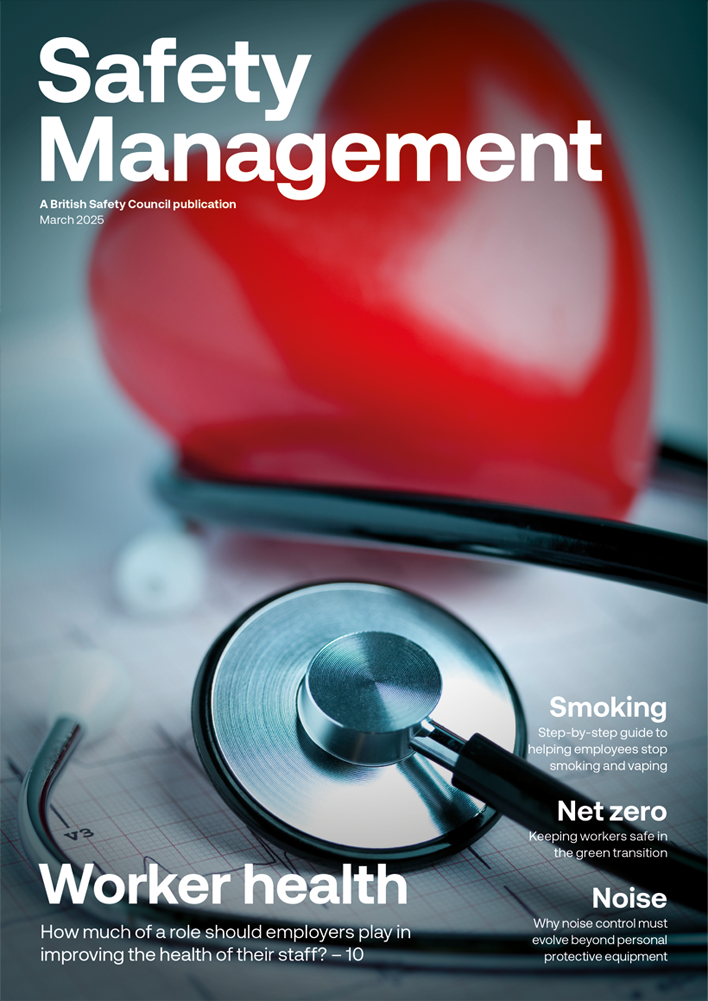Implementing water-saving measures can save a business money and energy – and boost its reputation as an environmentally-responsible organisation.
Features
Why water should be a priority for your business
The past few years have certainly been challenging for businesses – from Covid and the multiple lockdowns, to rising costs in the cost-of-living crisis. Naturally, this has meant many businesses haven’t viewed water as a top priority given everything else that has been going on. But with an ever-changing climate bringing more extreme heat events as well as population growth to contend with, now is the time to focus on water.
We’ve even seen a shift in policy in this area, with a national water demand reduction target for the non-household sector in England recently being announced (nine per cent reduction by 2038) as well as plans for a new water efficiency label for water-using products by 2025.
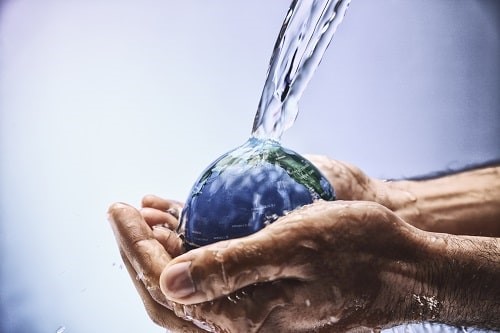 The more water you can save, the more water is left in the environment. Photograph: iStock
The more water you can save, the more water is left in the environment. Photograph: iStock
Here are seven key reasons why water should move up the priority list in your business and how taking water efficiency action right now can actually help your business in a number of ways:
Saving money – although water may not be your most expensive bill (especially with such high energy prices at the moment), saving water where you can will save your business money and help cut costs. Not just your water bill but also on your energy bill in the case of hot water. Data from Thames Water’s smart meter rollouts suggests that up to 25 per cent of water supplied to business customers could be leaks!
There are lots of examples out there of often simple water efficiency measures driving down costs – including EDF who saved £5,100 per year by identifying and fixing a leak using their water retailer’s Find and Fix service at one of their power stations. Meanwhile, News UK halved their water consumption and saved £5,000 a year by working with their retailer to replace faulty urinal cisterns and reducing their use, installing efficient showerheads and reducing flow through taps.
Increasing resilience – are water-resource related risks in your business resilience plans? How would your business cope without water even just for a few hours? Whether water is an obviously integral part of your business operations (spa hotels for example) or your reliance on water is more subtle (an SME with similar usage to domestic users, for example), the simple fact is all businesses across the UK rely on water to operate and for the health and safety of their employees (and customers).
Yet based on figures from regional water resource plans, it’s estimated that without us all taking measures to save water we face a shortfall of just over four billion litres per day by 2050 in England alone. So, we all need to use water more wisely to ensure we have resilient water supplies to protect the environment now and going forwards.
Taking action and making necessary investments now is also financially resilient – the cost of pre-emptive action is estimated to be around half the cost of failure, according to the National Infrastructure Commission. Businesses consume around 30 per cent of our public water supplies, not to mention private abstractors in addition to this,
so businesses have a big part to play. Resilient water supplies mean more resilient businesses.
Achieving net zero – every litre of water your business uses has a carbon footprint. There are the ‘operational’ emissions arising from treating and pumping water to you and from the removal of your drainage and wastewater. The UK Water Sector has an ambitious target of reaching net zero in terms of these emissions by 2030.
But these emissions are often dwarfed by the emissions arising in your premises from using water, especially hot water. So, saving water in your business and linking this to energy usage is critical – doing so will reduce your carbon emissions, helping you reach net zero targets and reducing energy (and water) bills. At a UK scale we estimate that reducing household and business water consumption by just 20 per cent would cut UK emissions by one per cent.
 Laura White: "We all need to use water more wisely to ensure we have resilient water supplies to protect the environment."
Laura White: "We all need to use water more wisely to ensure we have resilient water supplies to protect the environment."
Protecting the local environment – the water your business uses comes from local rivers and underground aquifers. These local water sources, including precious chalk streams in some cases, are hugely important for wildlife as well as our wellbeing. However, over 40 per cent of the biggest water-using businesses are in river catchments with low water availability.
The UN highlighted a few years back that ‘water is the medium through which climate change will be felt’, something we all saw first-hand last summer with temporary use bans enacted across many areas of the UK to protect water resources and the ecosystems that depend on them. The more water you can save, the more water is left in the environment, allowing these ecosystems to be resilient and thrive for us and wildlife to enjoy and value.
Boosting engagement – taking action on water efficiency as part of your wider sustainability plans is a great way to engage with your staff, stakeholders and customers. Water use is very visible and is something where everyone can make a difference, even through small actions – from turning off taps, filling the dishwasher, reporting a leaking toilet and/or taking part in water-themed awareness campaigns like Water Saving Week.
Corporate Social Responsibility (CSR) – linked to engagement, saving water helps demonstrate your CSR commitments and ESG (Environmental, Social and Governance) credentials. Driving water efficiency in your business can contribute positively to the well-known benefits of CSR: competitive branding, positive reputation, innovation opportunities and increased trust and strengthened relations with customers, stakeholders and communities.
Using water efficiently is an important part of the United Nations Sustainable Development Goals (UN SDG) which many businesses use as a framework for their CSR activity. UN SDG 6.4 states “by 2030, substantially increase water-use efficiency across all sectors” with an indicator of “change in water use efficiency over time”.
Enabling sustainable growth – water efficiency can contribute to ensuring economic growth is sustainable and doesn’t harm the environment and ideally, enhances it. Rather than water being a constraint on growth as it is in some areas where river catchments are closed for new abstractions, the concept of water neutral – or, in some cases, water positive – developments are being explored and practised. These allow for sustainable growth that protects and, in the case of water positive, enhances local water environments.
Organisations can also aim to be water neutral or water positive too – Sainsbury’s has three water neutral stores in the UK with two of these being triple neutral stores (zero operational carbon, waste and water), making savings of 25 million litres of water at the three stores per year. Meanwhile, Facebook, Microsoft, BP, PepsiCo and others have set targets to be water positive.
How can my business save water?
Fortunately, saving water can be very simple. Essentially, for most businesses, it boils down to:
Understanding how much you are using and where, plus inefficiency hotspots – no size fits all; business water use can vary massively between and within sectors. Every business is unique and needs its own plan of action depending on itrs operations and wider priorities.
Fixing leaks, fitting more efficient devices and looking at alternative water supply options (guided by inefficiencies identified) – even low-cost devices and solutions such as low flow taps and urinal controls can be effective.
Encouraging a water saving culture at work (and your wider community).
Because water use varies so much between businesses (much more so than households) knowing how much water you use, where your inefficiencies are and how much your water bills are is a great starting point. Without this information it is hard to develop a plan of action (leak fixes, devices, alternative supplies, water saving culture etc.), set targets and measure savings.
Smart water meters and data loggers can provide you with high resolution consumption data and help identify leaks which often show up as continuous night-time consumption. In fact, recent research found that 91 per cent of those with a smart meter find the data they provide useful.
As highlighted in the UK Water Efficiency Strategy to 2030, there is indeed a growing evidence-base and support for faster rollouts of smart meters for both businesses and households. The timely and useful consumption (and leakage) data they provide empowers customers to save water where they can and benefit from the savings that brings.
 Every litre of water your business uses has a carbon footprint. Photograph: iStock
Every litre of water your business uses has a carbon footprint. Photograph: iStock
What can I do next?
As a first step, find out who is responsible for water in your organisation. It might be the office manager, the facilities team, or you may have an environmental or sustainability lead. Speak to them about what is currently happening and what more could be done. If your organisation has a sustainability group, make sure water efficiency is included in their remit.
Engage with your water retailer or water company to see how they can help you. If you are in England, Wales or Scotland you may buy your water from a water retailer rather than direct from the water company. At Waterwise, a not-for-profit water efficiency NGO and the UK’s conscience on water efficiency, we have produced a simple guide with the sorts of questions you can ask them.
Use the steps above to create a water efficiency plan/strategy that works for your business (whether the actions and investments are big or small), saving you water and all the benefits that brings. See water efficiency as an opportunity to bring about positive change, be ahead of the curve and reduce your bills while doing so.
Waterwise is also here to help – we offer various packages including a Business Affiliate package that provides a gateway to other opportunities. We also provide a range of different services, including training sessions on water efficiency as well as recognising excellence in commitment to water efficiency through our Checkmark for Offices Award scheme. Bespoke packages can also be created, especially designed to meet individual business needs.
For more information and advice see: waterwise.org.uk
@Waterwise
Read the UK Water Efficiency Strategy to 2030 and how to get involved at:
waterwise.org.uk/strategy2030/
Laura White is Projects and research manager at Waterwise
FEATURES
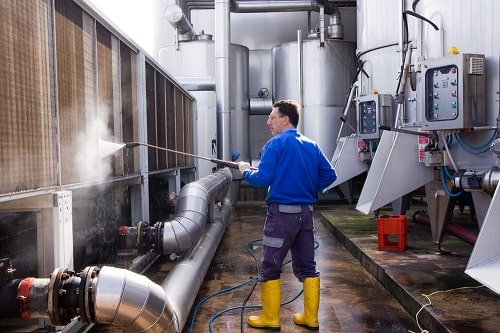
Machinery at work: why it’s vital to only select plant that offers suitable ingress protection
By Darren Hugheston-Roberts, TÜV SÜD on 10 March 2025
Machinery can deteriorate, malfunction or become unsafe when water or dust enters or if operators wrongly insert tools into the enclosure. It’s therefore vital to purchase plant that has been independently assessed to ensure it is robust enough to cope with the environment and the ways in which it will be used.
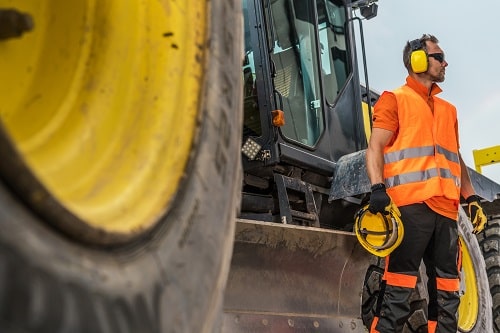
HSE inspections target hearing protection and noise control failures
By Peter Wilson, INVC on 07 March 2025
The Health and Safety Executive is currently conducting an inspection programme looking at the adequacy of employers’ noise control measures, while changes to how compensation claims for noise-induced hearing loss are assessed are predicted to result in higher payouts for affected workers. As a result, it is crucial employers review their noise risk reduction approach to ensure it reflects current best practice.
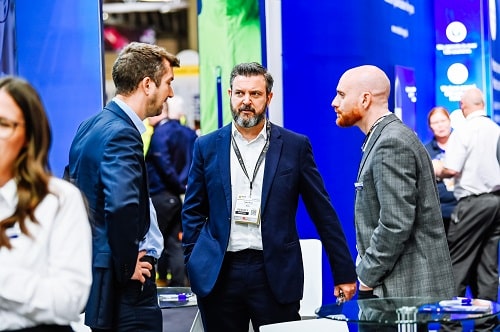
The Health & Safety Event returns to the NEC Birmingham
By Safety Management on 05 March 2025
The free-to-attend Health & Safety Event returns to the NEC in Birmingham on 8–10 April 2025, providing a superb opportunity for occupational health and safety (OSH) practitioners to access the latest products and solutions and expand their knowledge and expertise.


